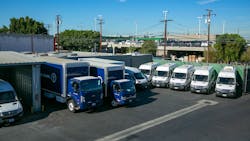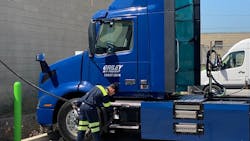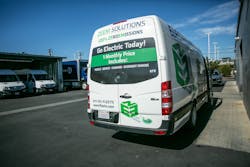Small fleets turn to fleet-as-a-service provider to begin electric journey
Investing in alternative power can be a big ask for a small fleet.
For eight years, Torrance, California-based freight forwarding fleet BMC Transport was running seven traditional internal combustion engine vehicles between the Los Angeles International Airport and the Inland Empire. A customer asked BMC for zero-emission deliveries as California pushes to decarbonize the trucking industry.
Instead of investing in electric vehicles and the charging infrastructure needed to keep its cargo moving along its daily 100-mile routes, BMC turned to Zeem Solutions, a zero-emission fleet-as-a-service provider based outside LAX.
See also: Planning for a zero-emission future in trucking
“We were drawn to them because they had EVs in their inventory—and they were available now,” BMC Transport's owner, Narciso Calderon, told FleetOwner. “We were told it would take six to nine months to get diesel vehicles from others. We currently have four Zeem vehicles: three Class 5s and one Class 6 truck.”
Zeem recently secured a $50 million investment from ArcLight Capital Partners to expand its FaaS offerings, which provides companies with battery-electric trucks, vans, and shuttle buses for a monthly fee. That fee covers vehicle leases, charging, maintenance, daily vehicle inspections, insurance, and washing.
Current Zeem vehicles use a return-to-depot model at the 3.1-acre LAX site that will be capable of charging 220 vehicles overnight, according to Paul Gioupis, co-founder and CEO of Zeem Solutions. Zeem currently has 77 EVs at its first depot, with room to grow to 220 vehicles. Its fast-charging ports could charge 500 to 600 commercial vehicles during the day.
“Come April of next year, we’re going to have 77 DC fast-charge ports, and then we’re going to have as many as 60 AC ports,” Gioupis told FleetOwner. “It will be the largest (commercial) EV-install in the United States that I know of—and possibly the largest install for EVs period, even looking at some of Tesla's installs.”
Zeem’s current fleet consists of EV shuttle vans, cargo vans, Classes 5-6 box trucks, and Class 8 tractors. Gioupis said he chose his first site because it is within 5 miles of more than 300 small and medium-size fleets that would qualify for Zeem’s service. He plans to add another 50 EV depots across the country over the next five years with Classes 2-8 vehicles. “We have every major airport in our line of sight,” he explained. “The near-term would be places like San Francisco, Newark, New Jersey, and New York.”
Decarbonization regulations affecting fleet decisions
While large fleets are more capable of creating their own zero-emission roadmaps, it’s more difficult for smaller fleets, which make up about 90% of all carriers, to decarbonize their equipment—from vehicle procurement to utility and charging infrastructure planning.
See also: CARB opens up public comments on Advanced Clean Fleets rule
“They do logistics really well. They do transportation very well. Utilities is a whole different beast,” Gioupis explained. “They’re very underserved, and they’re under the same mandates as the big fleets. We get a lot of fleet operators that come to me and say, ‘I’ve received this letter from CARB that says I can’t buy a diesel vehicle or else I’m going to be penalized. And I can’t run the routes that I need to.”
He said that when smaller fleets look at the costs of electric versus diesel, they’re faced with a choice of paying the CARB penalty or trying to figure out how to electrify on their own. “Zeem is a transformative way for a fleet operator to think about operating,” Gioupis said.
So long as a company runs routes shorter than 150 miles, Zeem would have similar monthly costs per vehicle as a fleet would pay to lease a traditional diesel truck, Gioupis said. Plus, he noted, small and medium fleets are being priced out of the real estate near LAX.
How fleets can get started with EVs
Calderon’s BMC Transport fleet was restricted to just seven vehicles at his yard in Torrance, which is about 10 miles from LAX, the 11th busiest cargo airport in the world. Gioupis visited Zeem’s site to look at one vehicle. He’s since added four to his operations.
While he’s too early into his Zeem partnership to know the actual return on investment, Calderon said the fixed cost helps. “Having all of the services included makes it easier for us to focus on our own business and not managing the vehicles all the time,” he said. “Having a fixed cost that doesn’t fluctuate makes it much easier for us to price our services and manage our cost while diesel prices are fluctuating.”
See also: ATRI: Trucking endures 'costliest year ever'
He said that his company had no zero-emission plan before working with Zeem. “Now we have the opportunity to provide our services in multiple markets through our partners in the freight forwarding world using Zeem’s model,” Calderon explained. “We are talking about expanding to other areas like Chicago as an example. We did not have a sustainability plan but now that we are operating EVs we are starting to promote that as a service that BMC provides our customers.”
Calderon added that he learned much more about the new ZE technologies for vehicles and charging, which has put his company on the decarbonization path. “The cost to get started was also much lower than starting with a diesel, so that also helped our business move to four vehicles, and I would imagine the low CapEx cost would help other fleets move faster and in larger volume,” he said.
Added Gioupis: “The environmental piece is incredibly important but if it does not pencil out, nobody’s going to do it. So I need to have a model that I can go, hand on heart, and say, ‘Look, we are making a difference. We’re transforming the way that business is going to be done for small- to medium-size fleets. And I know that what we’re doing is going to be transformative.”
About the Author
Josh Fisher
Editor-in-Chief
Editor-in-Chief Josh Fisher has been with FleetOwner since 2017. He covers everything from modern fleet management to operational efficiency, artificial intelligence, autonomous trucking, alternative fuels and powertrains, regulations, and emerging transportation technology. Based in Maryland, he writes the Lane Shift Ahead column about the changing North American transportation landscape.




